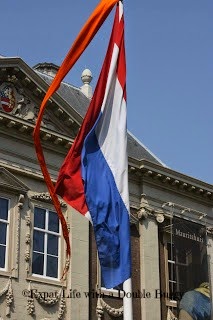 |
| Photo: (c) The Writing Well |
When my youngest son (our third) was born last October, the
kraamweek (the week after the birth) didn't quite go as planned. We came back from the hospital on a Friday morning and our interim
kraamzorg was stood at our front door to meet us. The first day home went as planned. Lots of rest, help, and time for my eldest two sons to meet their new brother.
The night however was a different story. Our new addition cried a lot at night. By that I mean unless he was being held upright he was crying. As soon as we laid him down his eyes sprung open and he began to scream. That meant, with labour and the birth included, I hadn't slept at all for three nights. I was a little tired to say the least.
Saturday night was a repeat of the night before. Four nights without sleep.
Then on Sunday morning I felt a little strange. It felt as if I was on the verge of slipping away into a dreamland, whilst lying in my kraambed. My kraamzorg (a trainee) came to bring me breakfast, was shocked by how I looked and flew back down the stairs to alert the experienced kraamzorg that all was not well upstairs. They both came charging back upstairs. I was conscious of everything that was going on around me but could not respond. No words came out, my head wouldn't move. My blood pressure was high and I had what I can best describe as the shakes. The kraamzorg called the midwife, who arrived quickly but then struggled to get an accurate blood pressure reading. Due to my unresponsiveness she called an ambulance, informing them not to come with sirens and lights.
A few minutes later I heard a siren getting louder and louder and my insides curdled. My eyes told those in the room that I was horrified with the arrival of an ambulance with "bells and tooters" blazing.
The next fifteen minutes were amongst the strangest of my life. Two ambulance personnel, a male and a female, began loading equipment on the bed. The room was a hive of activity with 2 maternity nurses, a midwife and my family milling around trying to help and get a grip on the situation.
After tests and questions the decision was made to take me to hospital in the ambulance, back to the maternity ward for checks. One of the ambulance crew said it seemed like I had gone in to shock. A birth and four nights with no sleep seemed a viable reason for this....
Somewhere amid the commotion I began to return to the land of the living and could communicate once more.
And so I made it downstairs with help from the ambulance personnel and my husband, and I was loaded on to a stretcher outside our house. Which is when I noticed that the arrival of the ambulance had attracted a sea of onlookers in the street and surrounding houses...... My husband took the baby in the car, as he would stay with me in the maternity ward to ensure that the breastfeeding could continue. My eldest sons stayed with kraamzorg until friends got there to look after them. It was chaotic, upsetting and stressful - for us all.
It was only the second time I had ever been in an ambulance. The first time was to accompany my brother when he had a serious asthma attack when we were out in Watford, England one night. It was certainly the first time I had ever been in a Dutch ambulance. By the time we were driving to the hospital I was
compos mentis again, and well aware of the drama of the past half an hour, hour - who knows how much time had passed.
Once we arrived at the ambulance entrance of the hospital we seemed to whizz through corridors, past a sea of faces waiting their turn in queues in various departments, until we arrived in the maternity ward. Familiar faces came to help me from the stretcher to a bed and started hooking me up to an array of machines.
Lots of tests ensued from a gynaecologist and a neurologist and I had a few more 'attacks' like I had had that morning. The result was that I had to stay overnight in the hospital. I was devastated - it wasn't how the kraamweek was supposed to be! The
kraamweek following the births of my first two sons are etched on my mind as wonderful weeks, a treasure trove of precious moments. And this time I ended up separated from the rest of my family, my husband home worried sick looking after our eldest sons who didn't understand anything that had happened, and me unable to properly care for my newborn.
Aside from a near collapse (luckily a nurse was holding on to me) walking back from the bathroom, the night passed without incident and the next morning I was allowed to return home. Kraamzorg returned. The kraamweek recommenced. The rest of the week passed without incident, but the sleepless nights continued. So we turned to an
osteopath.
He diagnosed our little one as suffering from silent reflux. He was having a rough time of it, hence the sleepless nights. I'd like to say that we got referred to the paediatrician, given medicine and all was well but the reality is that we struggled at night for many months and have only really had peace at night during the last month.
We've come through the other end - and the most amazing thing about all this is that our youngest son is a smiley, giggly, happy little boy - despite the less than easy start in this world.
 |
| Photo: (c) The Writing Well |


















